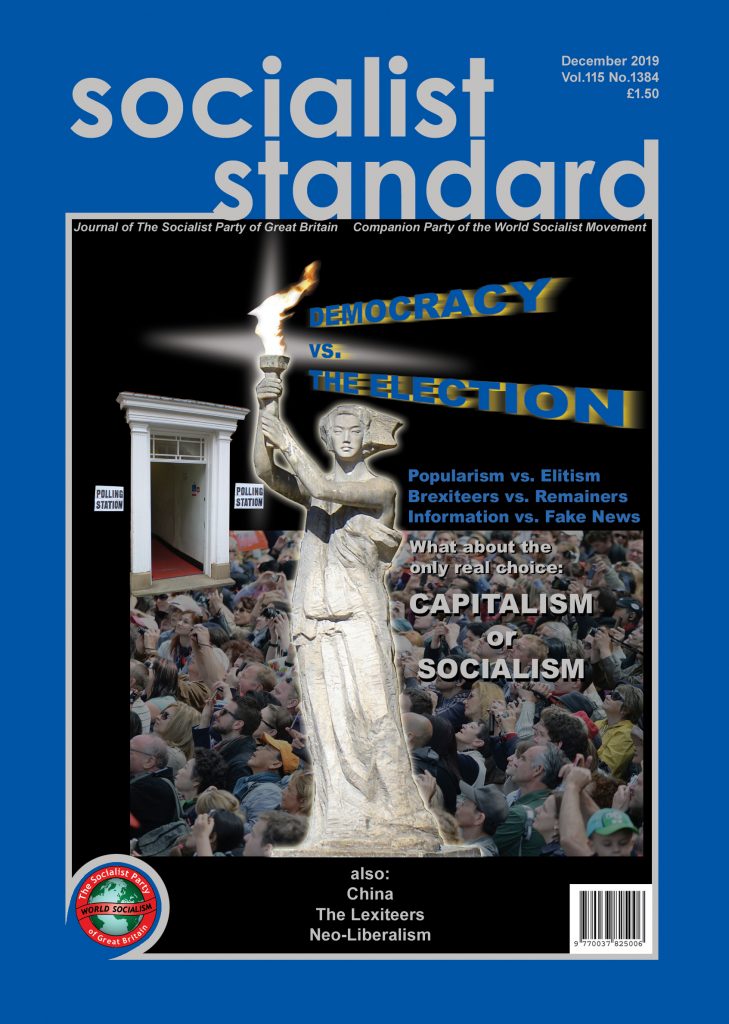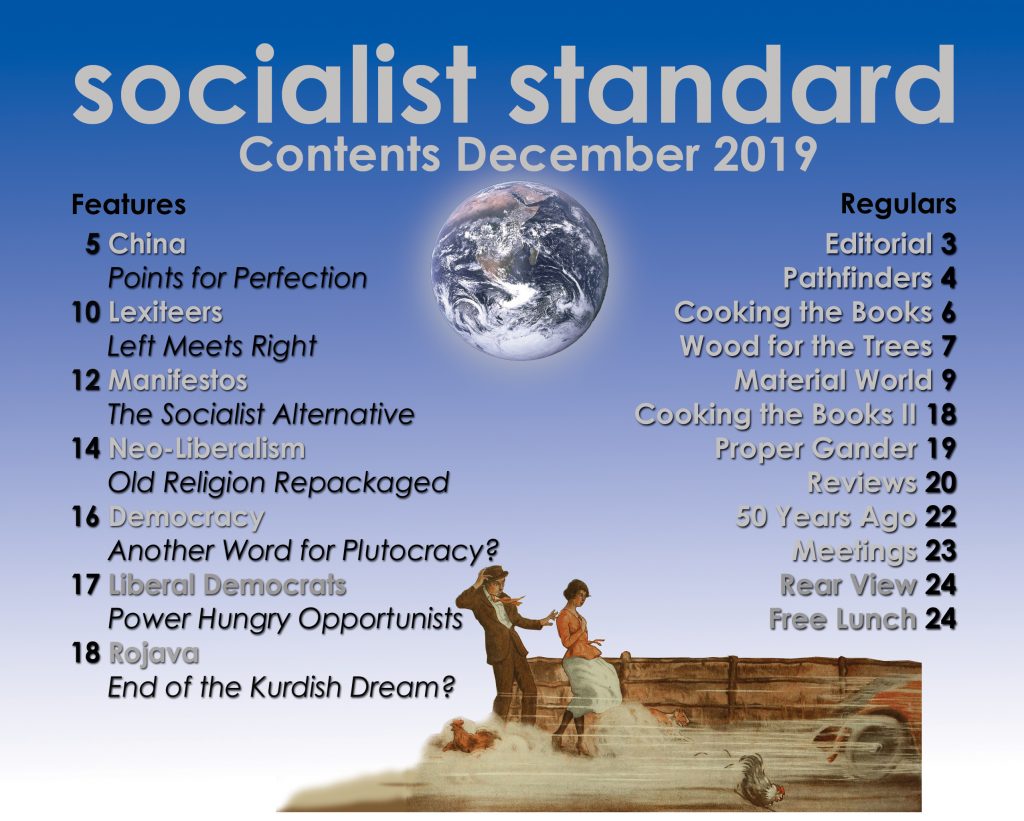The Socialist Party supports fellow-workers striking for higher wages and improved working conditions. As workers ourselves we know that under capitalism we get nothing save through organisation and struggle. The social conditions of capitalism, where a tiny minority own the means of life, inevitably give rise to a struggle over the division of wealth. The class struggle will last as long as capitalism because the interests of workers and owners are irreconcilable. Strikes are an expression of this class struggle though it is fair to say that few workers fully understand this. They do not recognise that there is an irreconcilable conflict between workers and owners everywhere. They do not recognise that workers have no country and that patriotism is a delusion and a snare. They do not recognise that the wages system shows up the dependence of the workers on the owners for a living.
Even if workers prevail the Socialist Party points out that this is not enough. All the cards are stacked against workers under capitalism. Being propertyless they depend on the owners for a living. On top of this there is a further disadvantage. The government represents the interests of the owning class. Any government has at its disposal a vast arsenal of political weapons to oppose any economic action by workers. Workers must come to realise the importance of political power and that they must control it before they can free themselves from wage-slavery. When workers do realise this then they will see the need for an independent workers’ party opposed to all other parties to carry the class struggle from the economic to the political field; a party whose sole aim is to win political power to end capitalism and set up socialism. The Socialist Party is such a party in this country.
Workers of all colours are united by a common economic interest under capitalism, to stand together against the ruling class. Beyond that all workers should cooperate to get rid of capitalism, with its privileges and its denials and with the prejudices which help to divide the working class into so called races, nations and so on. There is no permanent way of dealing with the effects of a class divided society other than getting rid of it. Socialists cannot but draw attention and participate the class struggle until such time as capitalism is defeated Then, and only then, will the term become "archaic” as classes themselves will cease to exist.
The Socialist Party takes as its mission the political awakening of working people. We invite all who see that there’s a problem and are ready to do something about it to join with us. With our organised strength, we will liberate the thinking of our fellow-workers and unleash their energy. We will win them to the cause for which they are already fighting. We will excite the people with a vision of a world of plenty. New technology such as Artificial Intelligence, robotics and automation provides better, cheaper and more products with less and less labour. Society now has the capacity to devote the energies and talents of its people to satisfying the material, intellectual, emotional and cultural needs of all. For the first time in history, we have the technological ability to put into effect the principle ’from each according to his ability, to each according to his need.’ For the first time in history, we can unite our movement against poverty and misery with its great cause: the fight to create a society of abundance, free from want.
It will be a momentous event to see people from all generations, from all ethnicities and from one race– the human race– come together. We have to get together to see a real, democratic social process in action. It is up to us as revolutionaries to realise that we do have a new vision to offer, and that society is waiting for someone to give them an understanding and a solution to the conflicts they are up against.
Even if workers prevail the Socialist Party points out that this is not enough. All the cards are stacked against workers under capitalism. Being propertyless they depend on the owners for a living. On top of this there is a further disadvantage. The government represents the interests of the owning class. Any government has at its disposal a vast arsenal of political weapons to oppose any economic action by workers. Workers must come to realise the importance of political power and that they must control it before they can free themselves from wage-slavery. When workers do realise this then they will see the need for an independent workers’ party opposed to all other parties to carry the class struggle from the economic to the political field; a party whose sole aim is to win political power to end capitalism and set up socialism. The Socialist Party is such a party in this country.
Workers of all colours are united by a common economic interest under capitalism, to stand together against the ruling class. Beyond that all workers should cooperate to get rid of capitalism, with its privileges and its denials and with the prejudices which help to divide the working class into so called races, nations and so on. There is no permanent way of dealing with the effects of a class divided society other than getting rid of it. Socialists cannot but draw attention and participate the class struggle until such time as capitalism is defeated Then, and only then, will the term become "archaic” as classes themselves will cease to exist.
The Socialist Party takes as its mission the political awakening of working people. We invite all who see that there’s a problem and are ready to do something about it to join with us. With our organised strength, we will liberate the thinking of our fellow-workers and unleash their energy. We will win them to the cause for which they are already fighting. We will excite the people with a vision of a world of plenty. New technology such as Artificial Intelligence, robotics and automation provides better, cheaper and more products with less and less labour. Society now has the capacity to devote the energies and talents of its people to satisfying the material, intellectual, emotional and cultural needs of all. For the first time in history, we have the technological ability to put into effect the principle ’from each according to his ability, to each according to his need.’ For the first time in history, we can unite our movement against poverty and misery with its great cause: the fight to create a society of abundance, free from want.
It will be a momentous event to see people from all generations, from all ethnicities and from one race– the human race– come together. We have to get together to see a real, democratic social process in action. It is up to us as revolutionaries to realise that we do have a new vision to offer, and that society is waiting for someone to give them an understanding and a solution to the conflicts they are up against.
We will educate the people about the economic revolution. Every day, the new technology throws thousands– labourers and managers alike– out of their jobs. Their labour is superfluous to a system that values only what it can exploit. If they cannot work, they cannot eat. Radical changes in the way a society produces its wealth call for radical changes in how that society is organised. The capitalist class cannot convince the people to believe in their system while that is destroying their hopes and dreams. They attempt to disarm the victims of capitalism by turning them against one another. We will inspire our people with the alternative: a society organised for the benefit of all. A society built on cooperation puts the physical, environmental, cultural and well-being of its people above the profits and property of a handful of billionaires. Working people will take control of all productive property and transforms it into commonly owned property, it can reorganise society so that the abundance is distributed according to need. We will endeavour to empower people with the understanding of their role in striving for this new society and imbue it with the confidence that it’s possible to win. We call on you to join us in this cause.











